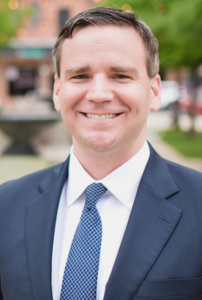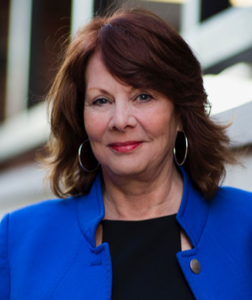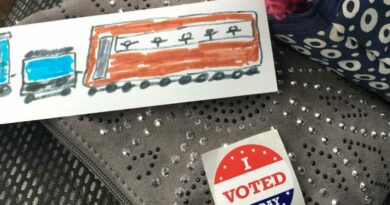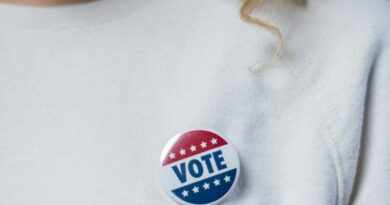Congressional District 24 Democratic Primary
Candidates: Jan McDowell, Derrik T. Gay, and Kathy Fragnoli.
What is the single most common issue voters have raised with you during your campaign, and how do you plan to tackle it?

Derrik T. Gay: After seeing the Capitol under attack on January 6th and as a Marine Corps veteran who took an oath to defend the Constitution, I felt a sense of duty to run for public office and defend democracy. The most common issue voters have raised with me during the campaign is the need to pass a Voting Rights Act. If we do not pass a Voting Rights Act, I fear that we will continue to slip into autocracy. Too many elected officials in Austin and in Washington have worked to make it harder to vote, not easier. With the gerrymandered map in my district, communities of color have been split up and their voice in the democratic process has been diluted. In Congress, I will work to make it easier for Americans to vote – not harder. The John Lewis Voting Rights Advancement Act needs to pass. I believe Americans should automatically be registered to vote when they turn 18 years old and that election day should be a national holiday. Extreme partisan gerrymandering has led to the near elimination of swing districts, more polarized politics, and less responsive representatives. We need to end partisan gerrymandering. Representatives, such as Beth Van Duyne, who voted to overturn a free and fair election and betrayed their oath to the Constitution, need to face consequences at the ballot box in 2022.

Jan McDowell: When I initiate the subject, I say that I am focused on saving our democracy and our planet. People always nod in agreement. If I ask them first, they generally roll their eyes and say, “Everything.” Based on that, it seems that the biggest issue is exhaustion. Our teachers are overcome by the emotions of wanting to teach and inspire students while fighting against both Covid and parents who refuse mask mandates. Our healthcare workers have been working onerous schedules and facing the agony of not being able to help so many who won’t help themselves. Everyone is facing the deluge of disinformation and outright lies that pour from our screens about science, history, and politics. Some steps I would suggest are passing the John Lewis Voting Rights Advancement Act and the For the People Act to safeguard people’s right to vote. Also the Trust In Congress Act, which would deny members of Congress the right to own and trade individual stocks. Politicians owe it to all Americans to face and to speak the truth. Together we can tackle anything if we all agree to do that.

Kathy Fragnoli: The past two Presidential election cycles have been the most divisive in modern history. We have allowed this to happen by electing people to local and national positions who choose to divide rather than unite; play political games rather than coming together in our darkest hours, and foment hate rather than spread love. Politicians are not held to the same standard that everyday Americans are. In fact, the very foundational principles we are taught in elementary school have completely fallen by the wayside when it comes to our elected officials communicating with each other. I have spent a 30-year career as a business and workplace mediator building coalitions and facilitating conflicts. I have seen two opposing parties, who have no hope of compromise at the beginning of the day, come together by the end. I believe these skills are needed now more than ever in a political era marked by indecisiveness and the ability to get the work done. The era of disrespectful partisan politics is over. It isn’t working. It’s time to come together.
How would you characterize the federal government’s — both the Trump administration and the Biden administration, as well as Congress — response to the pandemic?
Gay: One of the greatest tragedies of the pandemic was the politicization of the vaccines and that really started with the prior administration. I trust the vaccines and the science, and would always seek the advice of medical experts in shaping any federal policy. I believe the Biden administration has done a good job trying to encourage people to get the vaccine and has taken a lot of measures to keep people safe. It was refreshing to move from the Trump administration who largely had no federal plan and let the states fend for themselves for medical resources to the Biden administration who sought to lead and assist the states. I believe now that there is a vaccine, we have largely shifted to the stage of learning how to live with the virus. As the father of two young children, I share the fear known to families with small children or immunocompromised individuals. We need to closely monitor bedspace in hospitals and make responsible decisions to help minimize spread when there is strain on the system. We also need to do a better job of making free at-home testing available until we get this virus under better control. We also need to get more people health benefits in the State of Texas. I am also intrigued by learning from other countries. Some countries relied more on furloughing their workers and did not have the level of mass layoffs we saw in the U.S. Some studies seem to indicate that when the bonds between the employee and the company were not severed, employees were more likely to resume working at their place of employment and the economic recovery appears to be faster and more robust.
McDowell: The Trump administration did well to get the vaccines ready in an impressively quick manner. Other than that, they were a failure. No early acknowledgment of the crisis, no testing, no plan to distribute the vaccines once they were available. Not to mention the dangerous “medical” quackery pushing fake “cures.” The Biden administration did a great job setting up the national rollout of the vaccines. I even helped at the Texas Motor Speedway clinic (as a clipboard specialist!) several times. It felt then like Americans were pitching in to solve a shared crisis. On the other hand, testing was still not adequate, and guidance from the CDC has been confusing. A vaccine mandate would have brought the pandemic to an end. Congress could have, and I believe should have, passed a vaccine mandate. That would likely, though, have been yet another thing that would pass the House, only to get stuck in the Senate.
Fragnoli: The fact that a virus that has killed millions of people across the planet has somehow become part of the political game is beyond me. Our inability to figure out what we need to do to stop this horrible virus from killing nearly a million men, women, and children in this country is unacceptable. Nearly two years after COVID hit the United States, people are exhausted from the endless mandates and political games that have confused everyone and created “camps” of opinions. I believe we should have worked on educating the public on techniques to strengthen the immune system and developing therapeutics to treat COVID two years ago.
Do believe that everyone has fair and equitable access to the right to vote? Explain.
Gay: No I do not and I think the high rejection rates of the applications for mail ballots is a prime example. The state is in charge of organizing and running elections and any process that sees a rejection rate of upwards of 50% in large counties for mail ballot requests can only be called a failure. We should be doing everything possible to make it easier to vote, leverage technology to allow online registration, automatically register voters when they turn 18, and make election day a national holiday.
McDowell: Yes, for the most part. In District 24 in particular, polling places seem to be located within a reasonable distance from most voters, and the voting hours are consistent throughout the district. The recent state voting regulations, though, have certainly made access more difficult for all voters. The ID requirements and the confusion with mail-in ballots are making it harder to vote, when the goal, in my opinion, should be to make it easier. The bigger issue, though, is with actual representation. Even when people can vote, if their votes don’t really matter, that’s not acceptable. The main problem there is with partisan gerrymandering. Races are largely decided before a single vote is cast if the district is drawn to heavily favor one party. We must move to have an independent redistricting commission to draw those lines each ten years, following the national census.
Fragnoli: Newly enacted laws in Texas and the redistricting process disproportionately undermine minority groups. This year up to 40% of voter registration applications and absentee ballots were rejected. We need to make it easier to vote and follow the lead of other states that allow online registration. ( It took me three hours to change my voter registration card when I relocated from the old District 24 to the redistricted 24.)
How are you different from your opponent (or opponents) in this race?
Gay: While I respect both of my opponents in the primary and we all are proud Democrats, I am asking for the support of voters because I believe I am best positioned to win against the Republican incumbent in November. As a Marine, I took an oath to defend the Constitution and this country, went to war for my country, and continued to serve it after my military service. I can best hold the Republican incumbent accountable for her vote to overturn a free and fair election and provide a clear contrast for her failure to put country over party. The best leaders I served with in the military or in the civilian sector relied on hope, optimism and a positive vision for what the future holds. The Republican incumbent in this district relies on fear-mongering partisan politics and while that may have been effective to get her into office, I truly believe it does not make her a leader. Our country’s best days lie ahead of us, not behind us, and we need someone in office who seeks to find bipartisan solutions, when possible, The other thing that sets me apart from my opponents is my repeated focus on the economy. My wife and I moved to Texas to start a family here and a big reason for that was the incredible growth and economy we have in North Texas. This district contains a huge part of the economic engine of North Texas and includes DFW Airport, a key employer. I am committed to continuing the great economic growth in North Texas, but I want to see more families brought along in this success. Growth, with equity, is achievable, and we need to invest to build the economy of the future.
McDowell: As a citizen who stays informed about the issues, and as a CPA with the financial background to find practical solutions, I am determined to put those skills to work to level the playing field for all Americans. I ran for the District 24 seat in 2016 and 2018. Before I began, the gap between Rep. Marchant and the Democratic candidate was about 32 points. In 2016, I narrowed that to a 17-point deficit. In 2018, I came within 3 points of winning the seat! Now Republicans have decided that it’s too close for comfort, and have gerrymandered the district to try to make it “safe” for the incumbent. I’m determined to surprise them again! The name recognition, goodwill, and relationships I’ve been building over the years will help to make that happen. Growing up in Richardson, I developed a strong moral sense from my family, as well as a love of lifelong learning from my RISD teachers. Living in Carrollton for the past 40 years, I’ve raised two daughters to be successful, independent adults. I’ve also seen the challenges faced by seniors as my siblings and I helped our parents navigate their difficult final years. With a wide variety of life experiences, I bring a broad perspective to representing constituents across District 24. I’m committed to being accessible and accountable to them. I know that winning the seat means winning a JOB, not an award, and I am focused on the work and on the people, not on creating a political career. I’ve displayed a high degree of belief, conviction, commitment, and persistence that will serve the people of our district well.
Fragnoli: I believe that the skills I have refined for almost 30 years as a mediator set me apart from not just my opponents, but the congressional institution as a whole. Barack Obama ran on a message of hope, and I have adopted that same message for this campaign. I believe that everyone should have a seat at the table and that we are best served when everyone has the opportunity to participate. When we come together, there isn’t anything we cannot accomplish. I have hope for this country, I believe our best days are ahead of us, and I believe that my ability to unite is what we need in Congress.
Name one part of your platform that, if it was a bill, you feel would or should get bipartisan support.
Gay: My focus is on growing the economy here in North Texas and bringing more working families along in this growth. One of the biggest challenges the district faces is how we reemerge from this pandemic with a stronger, more equitable economy. Income inequality has been exacerbated by the pandemic and we need to get COVID under control. However, just returning our economy to where it was before the pandemic is not good enough. I previously worked the night shift in a South Dallas warehouse and while the city and the region have been seeing tremendous growth, many of the people I supervised were working two or even three jobs just to put food on the table for their children. That’s not acceptable. To that end, one of my first priorities that should have bipartisan support is to pass universal pre-k for 3- and 4-year olds. I support the Biden administration’s proposal of $200 billion over 10 years to serve 5 million children, save the average family over $13,000 in childcare costs, boost GDP by $28.6 billion by allowing more people to reenter the workforce earlier, and make us more competitive in a global economy. America is at its strongest when we have a robust middle class. The middle class has been under attack for decades, and the government can and should do more to strengthen the middle class.
McDowell: Preserving and protecting our planet is the biggest and most critically important challenge we face. My proposals to address that will not get support from everyone…only those people who want to breathe clean air and drink clean water, and want the same for their children and grandchildren. A basic maxim of economics says that we get less of things that are taxed, and more of things that are subsidized. Therein lies part of the basic answer to how to proceed on our nation’s energy future. We absolutely must address climate change as the “house on fire” emergency that it is. Renewable energy sources are the answer. Subsidies should be provided to encourage research and development on the storage and transmission issues that are currently the weak links in the system. Americans should receive tax credits for energy efficient improvements such as solar panels and electric cars. And fossil fuel companies, which have been making record profits while they drive our planet toward the ultimate cliff, must not get any further government supports or subsidies. We must, of course, keep in mind that the energy industry is one of our state’s largest employers, and it has been vital to the economic success of Texas and our country. We must make every effort to include people and their families and communities that have been reliant upon the oil and gas industry in our transition away from carbon-based energy sources. They will be facing both the threat of climate change and potential economic hardship, so policies must take into consideration how best to mitigate the effects of the transition.
Fragnoli: My platform is found on my website and it contains many ideas that I don’t see discussed much by other candidates, but which I believe are very obvious issues that need a fix. One of them is credit card interest rates. For example, many credit cards charge over 25% interest on balances yet the same banks only pay us only. 02% or less on our bank savings balances. This is usury and the federal government should reinstate a regulation that addresses the spread between retail interest earned and credit card interest charges as we often read. Many Americans have $7,000 insurance deductibles and need to put their emergency medical bills on their credit card. They are one hernia away from bankruptcy because of these high rates.






